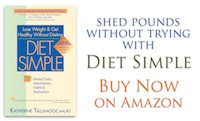Vitamin Supplements: Good For You? Dangerous?
- At October 13, 2011
- By Katherine
- In Articles, News
 4
4
 Original Content, The Washington Post
Original Content, The Washington Post
Multivitamins may increase death rates, according to a recent study published in the Annals of Internal Medicine. Only Calcium and Vitamin D were correlated with positive benefits.
This is alarming news as the study was large, well-conducted, and the women who participated had relatively high educations, incomes, and were healthy – a population which normally experiences superior health as compared to others. So how could these negative results be possible?
Let me explain…
Many of us want to include nutrients, the right vitamins and minerals in our diet. But we often don’t want to eat all the foods and calories required to get this balance. What we’re looking for is a magic supplement that will give us more energy, improve the quality and length of life and prevent the chronic diseases of today such as heart disease, cancer and diabetes.
While we know that certain foods have been shown to provide these benefits, can the right supplement do the same?
Leading researchers are increasingly convinced that while supplements can serve many positive purposes, they cannot take the place of a well-balanced diet, and may even be dangerous. Some background…
The Importance of Food
“The thousands of vitamins, minerals and phytochemicals [beneficial plant compounds] in whole foods act synergistically to create a more powerful effect than the sum of their parts, producing a result which cannot be recreated by supplements,” says Jeff Prince, vice president for education at the American Institute for Cancer Research.
Over the past century, nutrition experts gained a fuller appreciation of the need for a plant-based diet. Research began to show in the 1970s that certain patterns of eating, beyond vitamin and mineral intake, were influencing illnesses.
By the 1980s, they found that populations that ate more fruits, vegetables and high-fiber foods experienced lower rates of cancer, heart disease and diabetes. Also, by that time, discoveries had been made that newly discovered phytochemicals and certain vitamins and minerals acted as antioxidants and might prevent chronic diseases such as cancer and heart disease. After all, it had been found that people with high blood levels of two antioxidant vitamins (a form of vitamin A called beta carotene and vitamin E) had reduced lung cancer rates. It had also been observed that people who ate more dark-green leafy vegetables (high in beta carotene) experienced less lung cancer, even if they smoked.
Sensing a major breakthrough, the National Institutes of Health funded one of the biggest studies ever conducted. Known as the ATBC (Alpha-Tocopherol, Beta Carotene) Cancer Prevention Study, published in the New England Journal of Medicine in 1994, it tested the theory that the antioxidant vitamins beta carotene and alpha-tocopherol (vitamin E) would prevent lung cancer in smokers, the highest-risk population. After following 29,000 male smokers for six years, the stunned researchers found “a higher incidence of lung cancer among the men who received beta carotene supplements than among those who did not. In fact, this trial raises the possibility that these supplements may actually have harmful as well as beneficial effects.”
Needless to say, these revelations sent shock waves through the scientific community. “This study was a turning point in the nutrition field, especially when multiple studies kept confirming that supplements didn’t work at preventing cancers and heart disease,” says David Klurfeld, national program leader for human nutrition at the USDA’s Agricultural Research Service. “People think that we can pull out the fiber, pull out the antioxidants. But research does not back that up. Study after study says you gain the most benefit from whole foods.”
Personalized Nutrition
That is not to say that supplements are of no use. They can be of great benefit, when taken based on individualized needs. This study, and others like it, stress the importance of personalizing your supplements by reviewing your medical, family and personal history, your food intake, deciding what you might be lacking; THEN and only THEN making an educated decision, preferably with the help of a registered dietitian and your doctor.
Supplements simply can’t compete with better food choices. Consider these findings:
• When the ATBC Cancer Prevention study data was re-analyzed years later for consumption of fruits and vegetables, researchers found that while supplements did not prevent lung cancer, eating fruits and vegetables high in beta carotene (e.g., carrots, sweet potatoes), lycopene (e.g., tomatoes) and lutein/zeaxanthin (deep-green leafy vegetables such as spinach and kale) reduced lung cancer risk.
• A diet high in cereal and vegetable fiber (35 grams versus 15 grams) reduces the risk of colon cancer by 40 percent, according to recent findings in the EPIC (European Prospective Investigation into Cancer and Nutrition) study. But studies of fiber supplements have failed to find any benefits and some have found an adverse effect.
• A diet high in fruit reduces lung cancer risk by 40 percent, also according to new EPIC study findings. Another study found subjects with a high fruit intake had a 44 percent lower risk of lung cancer compared with subjects eating the least amount of fruit. But when subjects added beta-carotene supplements, there was no benefit from the fruit.
• Men who ate 10 servings of tomato products weekly reduced their risk of prostate cancer by 35 percent compared with men who ate fewer than 1.5 servings, according to a Harvard Health Professional study. While the benefit is largely attributed to the phytochemical lycopene, trials of lycopene so far have found it is less potent than the tomato.
• A diet high in fruits and vegetables reduced stroke risk by 28 percent, and fruit alone reduced the risk by 40 percent, according to a study published in the American Journal of Clinical Nutrition in 2003. No dietary supplements have been found that significantly reduce stroke risk.
• People who ate collard greens or spinach two to four times per week had a 46 percent decrease in risk for age-related macular degeneration (the leading cause of blindness) compared with those who ate these vegetables less than once per month, according to a study published in the Journal of the American Medical Association this year. No studies have found supplements prevent or improve macular degeneration.
• People who eat more soy have a decreased risk for coronary heart disease, breast cancer and prostate cancer. But when various components of soy foods have been isolated and studied, these finding have not been replicated, and some have found adverse effects.
• A diet high in antioxidant-rich foods helps prevent cardiovascular disease, but the studies of individual antioxidant supplements have been so inconclusive that the American Heart Association recently issued an advisory against taking them to reduce cardiovascular disease
“Researchers are working as fast as we can to find the most effective components in foods,” says Janet Novotny, research physiologist at USDA’s Human Nutrition Research Center in Beltsville. “But so far, studies have shown that while fruits and vegetables are associated with decreased risk of chronic disease, studies of the isolated compounds in fruits and vegetables haven’t shown an effect.”
Food and dietary patterns are complicated and expensive to study, and can defy the brightest minds and best intentions. In the meantime, the best advice is to eat a plant-based diet with at least five to nine servings of fruits and vegetables (you’ll get the most benefit with the higher amount), at least three to four servings of whole grains and regularly eat legumes as a side dish or occasionally as your protein source.
Read “My Health News Daily’s” Rachel Rettner’s article about this study.
For more fabulous tips and simple, effective ways to lose weight,
buy her book, Diet Simple!










Philippe Orlando
I’m sorry, I typed to fast! In my first post I meant “I couldn’t agree more!” not less!
David Keller
Katherine,
Thank you so very much for your dedication and sharing such important dietary information!
Your vibrancy is a motivation to us all,
David Keller
Fitness For Life Georgetown
Philippe Orlando
Couldn’t agree less, and from the 400 pages report of the international cancer society I talked to you about, we shouldn’t even take calcium supplement anymore. Only Vitamin D seems justified.
P.
Katherine
I appreciate your comments, Orlando! I agree that calcium supplements should only be taken on an individualized basis, when a person’s intake of high calcium foods has been analyzed and their medical and family history taken into account.